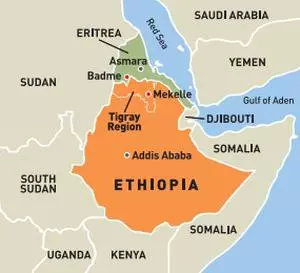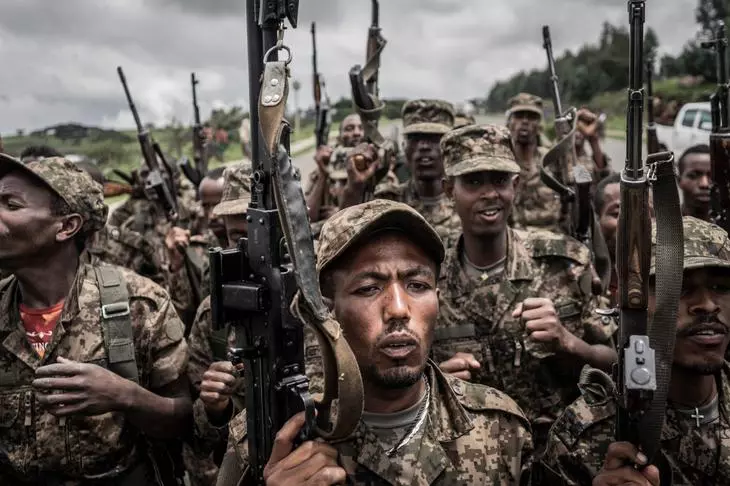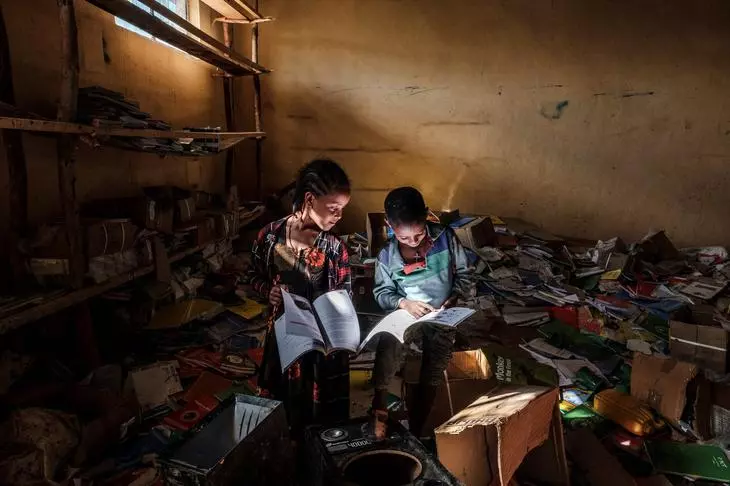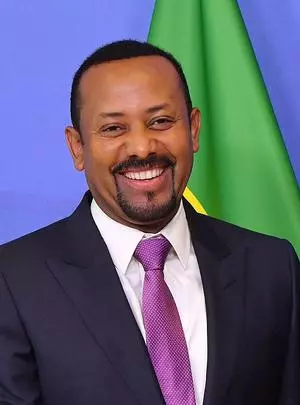December 02, 2022

On November 2 after 10 days of talks in Pretoria, Redwan Hussein (second from left), Prime Minister Abiy Ahmed’s National Security Adviser; and Getachew Reda (second from right), a senior TPLF leader, signed the agreement. Also in the picture (from left), former Kenyan President Uhuru Kenyatta, a mediator in the peace talks; former Nigerian President Olusegun Obasanjo, who represented the AU; and Phumzile Mlambo-Ngcuka, former South African Vice President. | Photo Credit: THEMBA HADEBE/AP/PTI
This is a move towards ending one of the most brutal conflicts the region has witnessed of late.
Ethiopia has moved back from the brink after two years of bitter internecine conflict that resulted in the deaths of more than half a million people and displacement of millions more. The scale of the fighting in the past two years has been compared with the situation in Ukraine today. But in early November, the Ethiopian government and the rebel movement in the Tigray province agreed to a permanent cessation of hostilities. It was unexpected but welcome news for the region and the international community.
The conflict in Ethiopia was one of the most brutal the Horn of Africa region has witnessed in recent decades. There were credible reports of ethnic cleansing and sexual violence on a large scale. The UN and human rights groups accused both sides of indulging in war crimes, including extrajudicial killings and looting. UN investigators had accused the Ethiopian government of engaging in “warfare by starvation”. The WHO said that the Tigray Region had run out of essential medicines, including vaccines and antibiotics.

The conflict started after the regional government in Tigray defied the federal government and unilaterally held elections. The government of Prime Minister Abiy Ahmed Ali viewed this move as a prelude to formal secession, and its suspicions were justified by the events that followed. In November 2020, the Tigray People’s Liberation Front (TPLF) attacked the Ethiopian army base in Mekelle, the provincial capital of Tigray. The Abiy government immediately ordered military operations to subdue the TPLF. He promised a quick decisive victory against the rebels.
It soon became clear that Abiy had underestimated the resolve of the Tigrayans. The Ethiopian army suffered a humiliating military defeat in June last year and was forced to withdraw its forces from the province. But by the end of 2021, it had regained the military initiative. The military’s advance into Tigray was carried out in coordination with the battle-hardened Eritrean Army, which crossed into Tigray with the tacit understanding of the Ethiopian government. Lethal weapons, including drones supplied to the Ethiopian military by Turkey, the UAE, and Iran, played a big role in turning the tide in the federal government’s favour.
The conflict became more complicated because of the burgeoning animosity between the Tigrayan and the Amhara ethnic groups. The Amhara ethnic group had dominated Ethiopian political life until the early 1990s. Amhara militias played a big role in the current conflict along with the Ethiopian army in the fight against the well-armed and -trained Tigrayan forces.
After 1992, the TPLF led by Meles Zenawi controlled Ethiopia’s destiny. A coalition dominated by the TPLF came to power after the overthrow of the leftist government in Ethiopia led by Mengistu Haile Meriam. Its ally in the fight against the Central government in Addis Ababa at the time was the Eritrean People’s Liberation Front led by Isaias Afwerki. Zenawi was one of the staunchest allies of the West in the region.
Zenawi’s death in 2012 while in office led to gradual changes and a loosening of the authoritarian grip the party had over the country. Zenawi had allowed Eritrea to secede after the overthrow of the Mengistu government. But relations between the two countries deteriorated over a territorial dispute, and they fought a war between 1998 and 2000. It was only after Abiy took over in 2018 that the war was officially declared as over. Abiy had made a historic visit to Asmara, the Eritrean capital, to repair the strained relations.
In 2019, he was awarded the Nobel Peace Prize in recognition of his efforts to bring stability to the Horn of Africa. Abiy is of mixed Oromo and Amhara parentage. The Oromos are the biggest ethnic group in the country but were for long sidelined in the country’s politics. The majority of the Oromos follow Islam. Abiy, however, is said to be a practising evangelical Christian.
Ceasefire agreement
After 10 days of talks in the South African capital, Pretoria, Getachew Reda, a senior TPLF leader, and Redwan Hussein, Abiy’s National Security Adviser, signed the present ceasefire agreement. “We have agreed to permanently silence the guns and end the two years of conflict in northern Ethiopia,” the joint statement issued by the two sides said. The talks were held on the initiative of the African Union (AU).

The peace deal coincided with the sSome soldiers of the Ethiopian National Defence Forces after finishing their training in the field of Dabat, 70 kilometres north-east of the city of econd anniversary of the Tigrayan conflict, which had threatened to go out of control leading at one point to fears that it could lead to a wider conflict in the already unstable region as the warring parties sought support from neighbouring countries. The agreement came in the wake of recent victories of the Ethiopian army on the battlefield.
The Ethiopian army and allied militias captured important cities in the Tigray region such as Shire and Sheraro, en route to Mekelle, while the Eritrean army kept up the pressure along their country’s border with the Tigray province. The latter’s role was crucial in bringing the rebels to the negotiating table and finally sue for peace. The Eritrean government had mobilised its citizens for the war, with those up to the age of 70 drafted into the army. The country’s leadership blamed the TPLF for the war.
When the conflict began, the Tigrayans had sent a missile targeting Asmara, and made important territorial gains in the first year. There were real fears that the emboldened Tigrayan miliary would march on Addis Ababa after capturing the nearby Amhara-dominated cities. At one point last year, they were less than 200 km from Addis Ababa. The Ethiopian army fought back, forcing the TPLF to retreat to their mountain hideouts.
The Tigrayans had also allied with another separatist group, the Oromo Liberation Front (OLF), with the objective of achieving regime change in Addis Ababa. The OLF continues to be defiant. In the week after the peace agreement, there was intense fighting between the army and the ORF in Oromia province. The government has accused the OLF of mass killings in recent months.
Disarmament of rebel fighters
The Pretoria peace deal contains several provisions for the disarmament of rebel fighters, the reintegration of Tigray into the Ethiopian federation, and the speedy disbursement of much-needed humanitarian aid to the Tigray Region, which has been under a tight military blockade since the conflict began. Because of the siege, the people of the region have been cut off from electricity, banking, and other essential services for 16 months. Five million people in the province are in desperate need of food aid.

The Ethiopian government has also given an undertaking that it will rebuild all the infrastructure that was damaged in Tigray in the conflict. The deal paves the way for Ethiopian troops to re-enter Mekelle in “an expeditious, smooth, peaceful and coordinated manner” and explicitly stipulates that federal forces will henceforth be in charge of airports, highways, border crossings, and other government facilities within Tigray.
Hotline gives hope
As of now, the guns have gone silent. But many African leaders and observers of the region are keeping their fingers crossed. “This moment is not the end of the peace process but the beginning of it,” warned former Nigerian President Olusegun Obasanjo, who represented the AU at the talks. A five-month humanitarian ceasefire both sides had agreed to earlier in the year had broken down, with both sides using the brief pause to rearm themselves.
Speaking to the media in Nairobi in the third week of November, Obasanjo said that there was another reason to be optimistic this time. “The first signs for me of the progress after the signing of the agreement is the fact that between them, they have exchanged a hotline,” Obasanjo said. According to the AU and Ethiopian officials, the hotline will address flare-ups in fighting and help the disengagement process.
FormeDehai@Dehai.orgr Kenyan President Uhuru Kenyatta, who along with Obasanjo played a key role as mediator, said the next meeting chaired by the AU would take place in Mekelle. He expressed the hope that there would be a big celebration when a final meeting was held in Addis Ababa before the year ended. He hoped a permanent solution to the conflict would be found by then.
The misgivings and suspicions on both sides may take some more time to disappear completely. Ethiopian state broadcasters said that the agreement was concluded with “a terrorist organisation”. Tigrayan radio and television said that the agreement was between “the Tigray government and the fascist Ethiopian clique”.
Dessalegn Chanie Dagnew, an Amhara leader and MP welcomed the agreement but said that he was disappointed that it did not address the claims of his ethnic group over disputed areas such as Welkait and Raya, now under the control of the Tigray government. “Any arrangement or outcome that does not recognise these lands as Amhara means that there will be no lasting peace in the region,” he said.

Abiy has, however, chosen to describe the November deal as “monumental” and as part of “broader reforms” he envisages for the country as a whole. “We have moved one step forward. We have discussed, agreed, and signed. The next thing expected from us is to implement honestly what we have promised to make the peace sustainable,” Abiy told the Ethiopian parliament in the second week of November. But speaking a week later to a cheering crowd in western Ethiopia, he said that the deal was possible only because of the “historic victory” of the Ethiopian army on the battlefield. Abiy called on the Tigrayan people to give up violence. “Tricks, evilness, and sabotage should stop here,” he said.
The Abiy government has agreed to drop the “terrorist designation” applied to the TPLF. Food and other forms of humanitarian aid started entering Tigray by the second week of November.
The Eritrean government has not yet officially reacted to the peace deal. It is, however, unlikely that Abiy would have kept his Eritrean allies out of the loop with regard to the peace agreement, which explicitly states that all foreign forces will withdraw from Tigray as the process of disarmament of rebel forces starts.
Article 6 of the agreement states that Tigrayan military commanders have agreed to meet their Ethiopian counterparts to supervise the disarmament of rebel forces in the province within 30 days.
The Crux
- The Tigrayan conflict started after the regional government in the province unilaterally held elections, and then in November 2020, the Tigray People’s Liberation Front (TPLF) attacked the Ethiopian army base in the provincial capital, Mekelle.
- On November 2, 2022, the second anniversary of the conflict, the Ethiopian government and the TPLF agreed to a permanent cessation of hostilities.
- This is the first step in the process of bringing to an end a brutal internecine conflict that has resulted in the deaths of more than half a million people and displacement of millions more. There were credible reports of ethnic cleansing, sexual violence, and other war crimes. The people of Tigray were under a tight military blockade that cut them off from from electricity, banking, and other essential services.
- Getachew Reda, a senior TPLF leader, and Redwan Hussein, Ethiopian Prime Minister Abiy Ahmed’s National Security Adviser, signed the deal in Pretoria, South Africa, after 10 days of talks.
- Former Nigerian President Olusegun Obasanjo represented the AU at the talks and former Kenyan President Uhuru Kenyatta played a key role as mediator.
- The Pretoria peace deal contains several provisions for the disarmament of rebel fighters, the reintegration of Tigray into the Ethiopian federation, and the speedy disbursement of much-needed humanitarian aid to the Tigray Region.
- The Ethiopian government has given an undertaking that it will rebuild all the infrastructure that was damaged in Tigray in the conflict.
- The deal paves the way for Ethiopian troops to re-enter Mekelle and explicitly stipulates that federal forces will henceforth be in charge of airports, highways, border crossings, and other government facilities within Tigray.





